Private issues (Gómez Palacio and the rest of Durango)
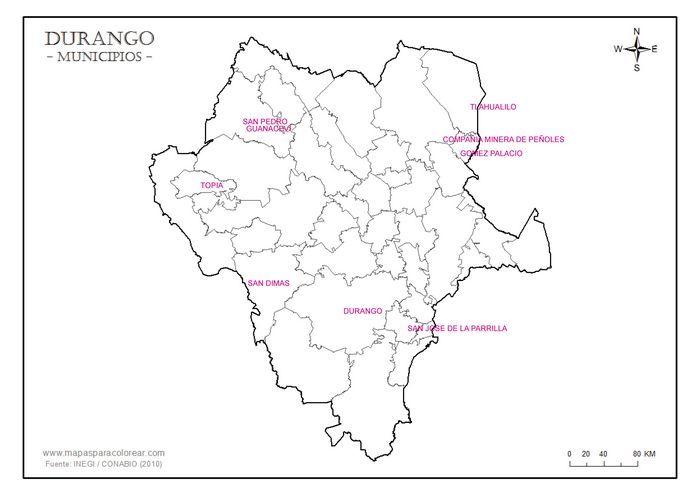
Mapimí
Compañía Agrícola del Tlahualilo
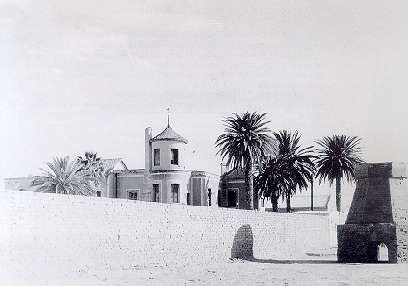
Hacienda of the Compañía Agrícola del Tlahualilo
The Compañía Agrícola del Tlahualilo was founded on 14 August 1885 and in 1903, after four years of complicated litigation, was taken over by a group of American and British capitalists.
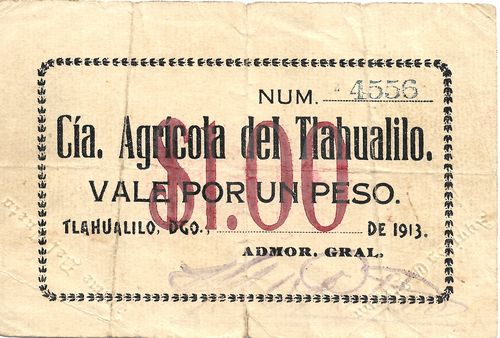 M1573 $1 Cía. Agrícola de Tlahualilo
M1573 $1 Cía. Agrícola de Tlahualilo
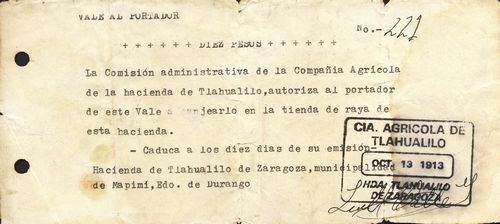
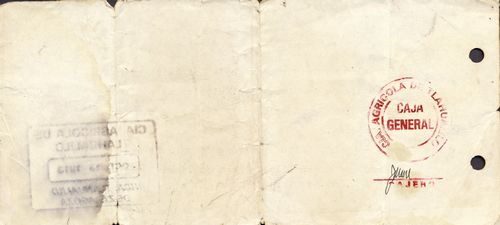
M1564 $10 Cía. Agrícola de Tlahualilo
| to | from | total number |
total value |
||
| $1 | includes number 4556 | ||||
| $10 | includes number 221 |
A $1 and a $10 vale are known from this ranch. The second, dated 13 October 1913, was time-limited to ten days and redeemable in the hacienda's tienda de raya. The signatories are [ ][identification needed] as Administrador General and [ ][identification needed].
Gómez Palacio
On 31 August 1913 it was reported that General Domingo B. Yuriar had met with the principal companies in the Laguna Comarca and would make an issue of $100,000 in bonos, to meet his costs. The issue would be fully guaranteed and circulate freelyEl Demócrata, Segunda Época, Tomo II, Núm. 6, 31 August 1913.
Rather than a military issue this seems to refer to vales issued by the Compañía Industrial Jabonera de la Laguna and the Compañía Algodonera e Industrial de la Laguna of Gómez Palacio. These refer to a contract (escritura pública número 788) of 21 August 1913[text needed]. The notes carry clause four of the undertaking on their reverse. This stated that the notes would circulated as long as the loan that the companies had made remained unpaid but that as soon as the companies were paid they would redeem their vales in notes or chequesQUARTA. – Los vales a que se refieren las clausulas anteriores entrarán en circulación desde la fecha de su [ ] y continuarán así por todo el tiempo que permanezca insoluta la deuda pero tan luego como ésta sea cubierta las Compañías prestamistas procederán inmediatamente a la amortización de los vales, mediante el pago en efectivo o cheques.
Compañía Industrial Jabonera de la Laguna
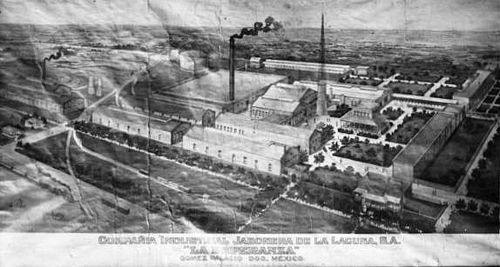
The soapworks "La Esperanza" of the Compañía Industrial Jabonera de la Laguna in Gómez Palacio
In December 1888 Juan Terrazas and John F. Brittingham teamed up to form a candle and soap production company with a capital of $14,000. Soon after they moved to Gómez Palacio, at the centre of cotton production, where Terrazas and Brittingham partnered with Francisco Belden, owner of the La Esperanza soap factory, as well as other capitalists based in the city of Monterrey, increasing the share capital to two and a half million pesos. They bought the factories La Alianza and La Favorita, of Torreón and San Pedro de las Colonias.
The Compañía Industrial Jabonera was organized in 1898 by the Terrazas-family, Juan Brittingham, a North American, and Tomás Mendrichaga, a Monterrey industrialist, landowner, and president of the Banco Mercantil de Monterrey, as a cooperative venture joining the interests of cottonseed producers and processors. The company manufactured cottonseed soap, and, most important, glycerine, a key element in high explosives. Although after 1902 a bitter dispute arose between the cotton planters and the company over the low prices paid for seed, the Jabonera was typical of Enrique Creel's ambitious efforts to coordinate the business activities of various regional elites and to extend his family's economic empire beyond the borders of ChihuahuaThe shareholders include Manuel Prieto,Enrique Creel, Juan Terrazas, Ramón R.Luján and the Banco Minero from Chihuahua; Testament. I. Bracho, Carlos Bracho Julio Bracho, Rafael Bracho, Luis Gurza. Francisco Asúnsolo, Guillermo Peters, Ventura Saravia from Durango; Práxedis de la Peña, José Negrete, Guillermo Purcell from Saltillo; Francisco Madero from La Laguna/Parras; John Brittingham, Federico Ritter, Carlos González , Pedro Torres Saldaña, Rafael Arocena, Leandro Urrutia, Joaquín Serrano, Carlos Arriaga, José María Urrutia, Ulpiano Ruiz Lavín, Ventura G. Saravia, Carlos González, Andrés Medellín, Torres Hermanos and Gilberto Lavín from La Laguna, the Banco Central Mexicano, Saturnino Sauto, Francisco Martínez Arauna, Feliciano Cobián from Mexico City, Eusebio González and Sucesores E. González from Celaya; Emeterio V. Lavín from San Luis Potosí; Maiz Hermanos, Ernesto Madero, Tomás Mendrichaga, Sucs. Hernández Hnos, Patricio Milmo Hijos Suc., Francisco Armendaiz Suces. and José Belden from Monterey, and Daniel Milmo from Laredo, Texas..
The Compañía Industrial Jabonera was intrinsically connected with the Compañía Nacional Mexicana de Dinamita y Explosiva, which epitomized the profitable combination of regional, national, and foreign interests and the importance of political influence during the Diaz era. It was established in 1902 in the Hacienda de Noé, Mapimí by the Terrazas-Creels, Brittingham, the Financiera por la Industria en México (a consortium of Mexico City investors), and the Societe Centrale de Dynamite of France. The company obtained a concession to manufacture dynamite in Mexico. With the cooperation of the Mexican government (both Porfirio Díaz, jr., the son of the President, and Julio L. Limantour, the son of Finance Secretary José Y. Limantour, were on the board of directors) which raised the tariff on imported explosives and exempted the company from all import duties, the new trust acquired a monopoly on dynamite sales. The Terrazas-Creels profited doubly by selling glycerine from their Jabonera operation at high prices to the dynamite monopoly and then selling dynamite at high prices to desperate mine owners. Despite its obviously detrimental effect on the mining industry, the powerful trust operated unchecked.
Other shareholders and board members of the Compañía Nacional Mexicana de Dinamita y Explosiva included Enrique Tron, Ernesto Pugibet, Saturnino Sauto, Hugo Scherer jr., Salvador Cancino, Maurice A. de Lille, Augusto Genin and Roberto Núñez, jr..
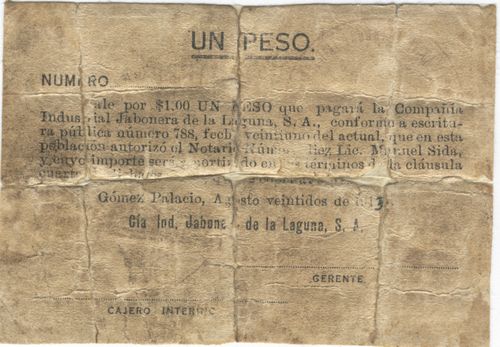 M1539 $1 Compañía Industrial Jabonera de la Laguna
M1539 $1 Compañía Industrial Jabonera de la Laguna
| date on note | from | to | total number |
total value |
||
| $1 | 21 August 1913 |
These notes were signed by the gerente and cajero interino.
Compañía Algodonera e Industrial de la Laguna
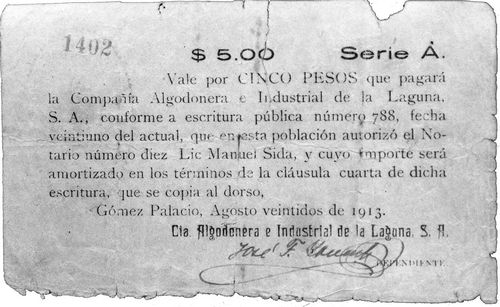 M1541 $1 Compañía Algodonera e Industrial de la Laguna
M1541 $1 Compañía Algodonera e Industrial de la Laguna
| date on note | from | to | total number |
total value |
||
| $5 | 22 August 1913 | includes number 1402 |
At the end of the 19th century the sons of Santiago Lavín formed the company Santiago Lavín Sucesores, which in 1907 changed its name to the Compañía Algodonera e Industrial de La Laguna, S. A. The company’s objects were the exploitation of its farms and the implementation and development of all kinds of industries and companies connected to agriculture (la explotación en todos sus ramos de las fincas rústicas que son propiedad de los socios y la implantación y desarrollo de toda clase de industrias y empresas inherentes y anexas á la agricultura) and it owned a number of haciendas. Between 1898-1910 the Lavín were involved with some of the most important industrial and financial projects in the region. However, the family business began to have serious difficulties, management problems and excessive indebtedness that led it, on the eve of the Revolution, to a state of virtual bankruptcy. The picture was aggravated when the youngest brother, Pablo Lavín, ended up joining the rebel forces.
These notes were authorised in the same escritura pública núm. 788 of 21 August as the Compañía Industrial Jabonera notes above. They are signed by José F. [ ][identification needed] as Dependiente.
| José F. [ ] |  |
In February 1914, following Rios Larenzana’s instructions, the jefe político of Durango, Silvestre Dorador, prohibited companies[text needed] from issuing paper money or tarjetas de valor. He gave them 15 days to withdraw their issues or face punishment under the law¡Patria Libre!, Tomo II, Núm. 20, 17 February 1914. Ironically, Dorador was a printer and so might have produced some of these vales.
On 24 April Pastor Rouaix told Coronel Manuel Madinabeitia, Villa’s Jefe del Estado Mayor in Torreón, that as the notes of the Cía. Industrial Jabonera de la Laguna and of the Cía. Algodonera were been accepted with difficulty it would be convenient to withdraw them, exchanging them for soap or wheatADUR, Libro Copiador 267, Hacienda 11 July 1913 - 25 April 1914, p987. A few days later a newspaper reported that, because of the depreciation of these two companies' notes, the government had arranged with the Jefatura de Armas in Torreón to redeem them, for the account of the state, in the Dirección General de Rentas in Torreón and in the Recaudación in Lerdo. The companies would honour the redeemed notes with soap and wheatEl Demócrata, Segunda Época, Tomo II, Núm.95, 29 April 1914.
Miguel Trad
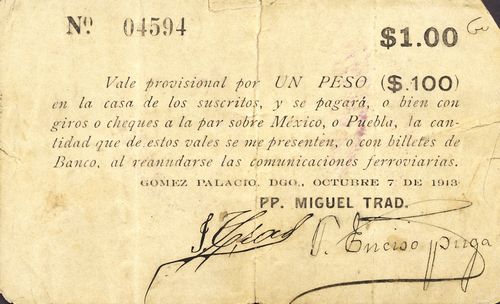
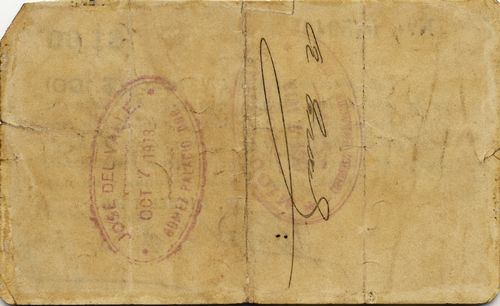 M1542 $1 Miguel Trad
M1542 $1 Miguel Trad
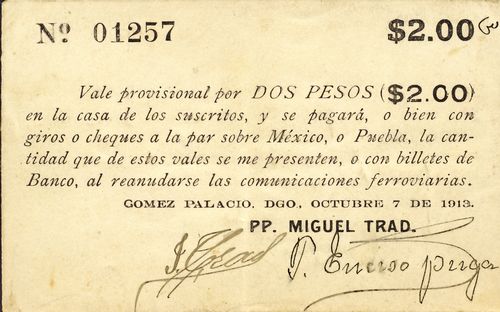
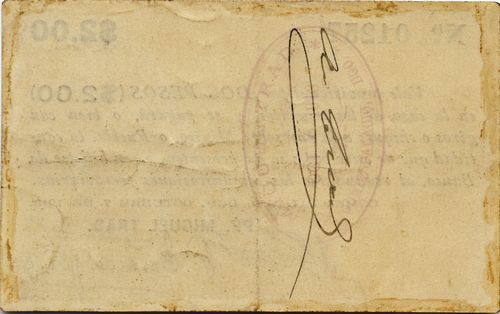 M1543 $2 Miguel Trad
M1543 $2 Miguel Trad
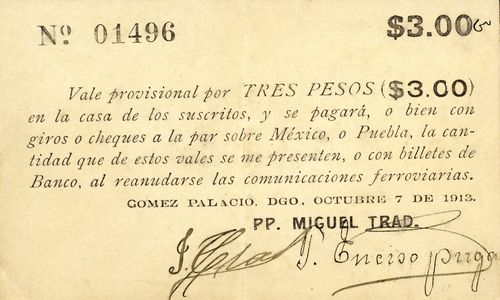
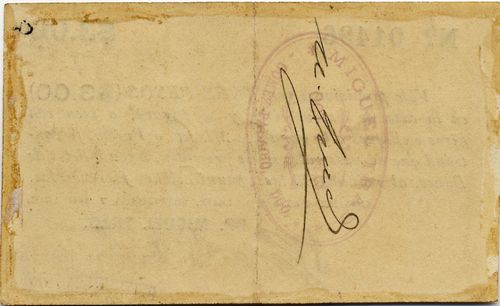 M1544 $3 Miguel Trad
M1544 $3 Miguel Trad
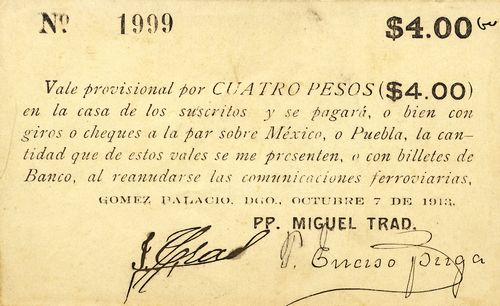
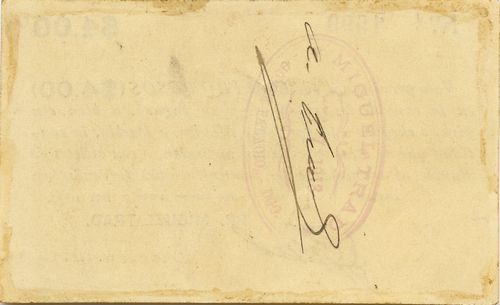 M1545 $4 Miguel Trad
M1545 $4 Miguel Trad
| from | to | total number |
total value |
||
| $1 | includes numbers 04594 to 05381 | ||||
| $2 | 00001 | includes numbers 00277 to 01257 | |||
| $3 | includes numbers 01168 to 01496 | ||||
| $4 | 00001 | includes numbers 00777 to 1999 |
These vales are dated 7 October 1913, the same as the bank-on-bank cheques, and will have also been issued because of the lack of currency while Gómez Palacio was cut off from the rest of the country. They were to be redeemed either with cheques drawn on Mexico City or Puebla or with banknotes, once communications had been reestablished. They are signed by [ ] Trad[identification needed] and Francisco Enciso Puga(?). There is a third signature, [ ][identification needed] over the stamp on the reverse.
|
Trad’s father, Miguel Trad Jacob, was originally from Lebanon so his son could be described as ‘a subject of the sultan of Turkey’. Trad senior was an architect, responsible for the Moorish style clock tower in Ciudad Lerdo. Trad himself was involved in general commission business, banking and cotton buying in the Comarca Lagunera. He suffered during the Revolution. In July 1914 he was sued in the El Paso court with the plaintiff asking for the attachment of five carloads of cotton in the El Paso yards since Trad had not paid the rental on one plantation and 25 percent of the cotton produced on two other plantationsEl Paso Herald, 31 July 1914. In September 1914 he was sued in the same court for the payment of a draft for $28,000 U. S. drawn in Gomez PalacioEl Paso Herald, 24 September 1914. On 16 February 1916 Trad wrote to the governor asking to be excused paying his taxes. His ranches, “Nazareno y Anexas” and “Sombreretillo y Anexas”, had been confiscated on 29 March 1915 and returned six months later, on 22 September, but in a far worse state, missing all the cotton that he had had, some of his mules, his tools and other effectsADUR, Fondo Secretaria General de Gobierno (Siglo XX), Sección 6 Gobierno, Serie 6.7 Correspondencia, caja 7, nombre 57. He did not seem to recover as in November 1920 the Torreón press reported that he had been arrested in Mexico City and declared in bankruptcy. It was believed that the failure was probably due to large loans to the cotton raisers on premature cropsEl Paso Herald, 30 November 1920. |
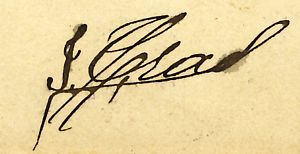 |
| Francisco Enciso Puga | 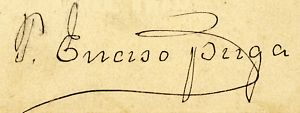 |
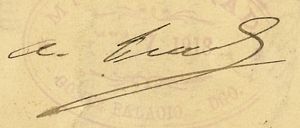 |
San Dimas
Minas de Candelaria
On 2 March 1914 representatives of the workers at the Minas de Candelaria in San Dimas complained to the jefe político, Rodolfo Salcido, that the company had been told by the government to withdraw the vales[images needed] with which it was paying workersADUR, Fondo Secretaria General de Gobierno (Siglo XX), Sección 6 Gobierno, Serie 6.7 Correspondencia, caja 7, nombre 12.
San José de la Parilla
Jesús María Galdívar
This storekeeper issued a few vales[images needed] in late 1913ADUR, Fondo Secretaría General de Gobierno (Siglo XX), Sección 6 Gobierno, Serie 6.1 Acuerdos, caja 1, nombre 3.
Eugenio Avila
This storekeeper issued a few vales[images needed] in late 1913ADUR, Fondo Secretaría General de Gobierno (Siglo XX), Sección 6 Gobierno, Serie 6.1 Acuerdos, caja 1, nombre 3.
